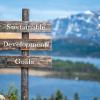The TISS group explores innovative solutions to environmental issues that integrate social, institutional, and governance drivers with technological and economic considerations, with an emphasis on improving conditions for the most deprived and marginalized in society.
The research objective of TISS is to identify, analyze and promote innovative technological, social and institutional solutions for human development that leave no one behind and that respect planetary boundaries. Novel approaches are required to achieve a rapid transformation that reconciles much needed human development, particularly for the most deprived and marginalized in society, with environmental preservation and ecosystems restoration. Such solutions span a wide range from digital service provision, to integrated sharing and circular economy concepts, to decentralized, distributed infrastructures which empower active “prosumers”. Central to them all is that they can provide improved access to and provision of services critical for human well-being (nutrition, shelter, health, mobility, communication, social interactions) with vastly reduced resource and environmental footprints.
TISS research emphasizes particularly two focal areas:
- A systemic analysis of technological, social and institutional innovations (including inter alia new business models, social entrepreneurship, and novel public policy designs) with a focus on end-use services for human wellbeing that minimize negative environmental impacts.
- Integration of heterogeneity, governance, distributional and equity considerations in policy analysis and implementation under a broader framing of transformations towards resilient & sustainable futures.
TISS research can draw both on the accumulated research achievements of its research staff, novel methodological approaches, as well as a wide array of online resources (see also below) made available for the use of the wider scientific and policy communities and that provided critical inputs to the work of the IPCC and The World in 2050 Initiative. Important research TISS can build on include for example (see below links to selected publication highlights): A thorough understanding of innovation systems combining conceptual with detailed empirical case studies; search on granular technology options and their advantages for equitable access to services and for rapid upscaling; empirical research on distributions and deprivations of access to service provision critical for human development; the influential research on Decent Standards of Living, again combining conceptual theoretical work with empirical quantifications.
The group’s three research areas include:
Energy services and infrastructure for decent living
Access to energy services and basic infrastructures are fundamental to meeting basic human needs, and a key requirement in the fight to eradicate poverty around the world and achieve decent living standards (DLS) Using the lens that people demand amenities and services rather than products and goods, this research entails both a diagnostic (identification of provisioning gaps) as well as a policy dimension (identifying novel options and crafting strategies for their rapid rollout and implementation). This research can build on considerable in-house knowledge, data and tools that were developed in pioneering work on describing heterogeneity in levels of service provisioning, a broader focus on distributive justice in human and planetary wellbeing, and the multiple dimensions of inequality, modeling energy access, as well as the development of the concept of Decent Standards of Living.
Technological, social, and institutional innovation for development
Meeting development needs under planetary boundaries requires novel solutions combining technological, social and institutional innovations which are interdependent. TISS research aims to identify those novel solutions that provide needed services while minimizing negative environmental externalities and provide new business and economic opportunities for development. Examples include digital service provisions and novel forms of shared mobility that seamlessly integrate public transport with on-demand private mobility via shared vehicle fleets. This research can draw on considerable in-house expertise on innovation systems and the determinants of successful (or unsuccessful) innovations from two decades of prior research at IIASA.
Governance and institutional structures
Quality of institutions and effective governance are some of the key enablers of feasible transformations of our societies and economies towards a climate-neutral and sustainable world. TISS research is building bridges between political science and political economy approaches, and quantitative scenarios and modeling efforts, to enhance the representation of governance and institutional capacities that, for instance, effect the extent to which adaptive capacity of a society is constrained or climate policies and low-carbon transition pathways are feasible. Work in this area aims to contribute to understanding of the role of policies, institutions and governance in sustainable energy system transitions.
Online Resources, Tools, and Databases
- Energy Primer Textbook
- Scaling Dynamics of Energy Technologies Data Base SD-ET
- Energy and Carbon Emissions Uncertainties Data Base ECDB
- Primary, Final and Useful Energy Data Base PFUDB
- Logistic Substitution Model software LSM2
- Energy Access Tool
- Fair Mitigation Tool
- Case Studies on Energy Technology Innovation
Selected Publications Highlights
- Creutzig, F., Niamir, L. , Bai, X., Callaghan, M., Cullen, J., Díaz-José, J., Figueroa, M., Grubler, A. , et al. (2022). Demand-side solutions to climate change mitigation consistent with high levels of well-being. Nature Climate Change 12 36-46. 10.1038/s41558-021-01219-y.
- Grubler, A. , Wilson, C. , Bento, N., Boza-Kiss, B. , Krey, V. , McCollum, D., Rao, N. , Riahi, K. , et al. (2018). A low energy demand scenario for meeting the 1.5 °C target and sustainable development goals without negative emission technologies. Nature Energy 3 (6) 517-525. 10.1038/s41560-018-0172-6.
- Kikstra, J., Mastrucci, A. , Min, J. , Riahi, K. , & Rao, N.D. (2021). Decent living gaps and energy needs around the world. Environmental Research Letters 16 (9) 095006. 10.1088/1748-9326/ac1c27.
- Pachauri, S. , Pelz, S. , Bertram, C., Kreibiehl, S., Rao, N.D. , Sokona, Y., & Riahi, Keywan (2022). Fairness considerations in global mitigation investments. Science 10.1126/science.adf0067.
- Rao, N. & Min, J. (2017). Decent Living Standards: material prerequisites for human wellbeing. Social Indicators Research 1-20. 10.1007/s11205-017-1650-0.
- TWI2050 - The World in 2050 (2020). Innovations for Sustainability. Pathways to an efficient and post-pandemic future. Report prepared by The World in 2050 initiative. International Institute for Applied Systems Analysis (IIASA) , Laxenburg, Austria. 10.22022/TNT/07-2020.16533.
- Wilson, C. , Grubler, A. , Bento, N., Healey, S., De Stercke, S., & Zimm, C. (2020). Granular technologies to accelerate decarbonization. Science 368 (6486) 36-39. 10.1126/science.aaz8060.
- Zimm, C. (2019). Methodological issues in measuring international inequality in technology ownership and infrastructure service use. Development Studies Research 6 (1) 92-105. 10.1080/21665095.2019.1605533.
- Andrijevic, M., Crespo Cuaresma, J., Muttarak, R., & Schleussner, C. F. (2020). Governance in socioeconomic pathways and its role for future adaptive capacity. Nature Sustainability, 3(1), 35-41.
- Brutschin, E., Pianta, S., Tavoni, M., Riahi, K., Bosetti, V., Marangoni, G., & Van Ruijven, B. J. (2021). A multidimensional feasibility evaluation of low-carbon scenarios. Environmental Research Letters, 16(6), 064069.
- Hickmann, T., Bertram, C., Biermann, F., Brutschin, E., Kriegler, E., Livingstone, J. E., ... & Van Vuuren, D. (2022). Exploring global climate policy futures and their representation in integrated assessment models. Politics and Governance, 10(3), 171-185
Models, tools, datasets
Projects
Staff
News

09 July 2024
IIASA Justice Framework

21 June 2024
Supporting the right small changes can have big impacts

19 June 2024
IIASA at the UNFCCC Bonn Climate Change Conference 2024
Events
Focus

14 June 2024
Expert workshop on digitalization narratives and climate change mitigation
Charlie Wilson and Elena Verdolini share insights and experiences from an expert workshop on the impacts of digitalization on energy, materials, the economy, markets, lifestyles, and society, and how these impacts directly or indirectly affect greenhouse gas emissions.

22 January 2024
Navigating the climate justice landscape
IIASA researchers Caroline Zimm and Kian Mintz-Woo explain the benefits of a recently developed operational framework that aims to bring clarity to the often implicit and varied justice considerations in climate mitigation scenarios, fostering a shared language and understanding to enhance decision-making processes in the intricate landscape of climate policy.
Publications
Hirata, A., Ohashi, H., Hasegawa, T., Fujimori, S. , Takahashi, K., Tsuchiya, K., & Matsui, T. (2024). The choice of land-based climate change mitigation measures influences future global biodiversity loss. Communications Earth & Environment 5 (1) e259. 10.1038/s43247-024-01433-4. Oshiro, K. & Fujimori, S. (2024). Mid-century net-zero emissions pathways for Japan: Potential roles of global mitigation scenarios in informing national decarbonization strategies. Energy and Climate Change 5 e100128. 10.1016/j.egycc.2024.100128. Bagheri, M., Gomez Sanabria, A. , & Höglund-Isaksson, L. (2024). Economic feasibility and direct greenhouse gas emissions from different phosphorus recovery methods in Swedish wastewater treatment plants. Sustainable Production and Consumption 10.1016/j.spc.2024.07.007. (In Press) Mastrucci, A. , Guo, F. , Zhong, X., Maczek, F., & van Ruijven, B. (2024). Circular strategies for building sector decarbonization in China: A scenario analysis. Journal of Industrial Ecology 10.1111/jiec.13523. MacDougall, A.H., Rogelj, J. , Jones, C.D., Liddicoat, S.K., & Grassi, G. (2024). Detecting climate milestones on the path to climate stabilization. Environmental Research Letters 19 (7) e074065. 10.1088/1748-9326/ad5ab1.











